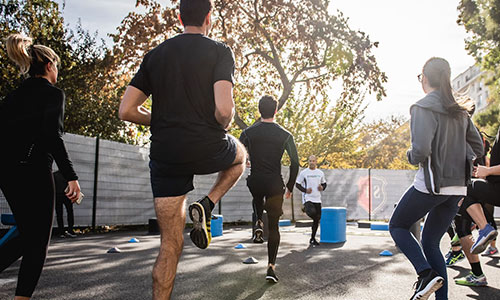Avoid These 10 Common Training and Racing Mistakes for Optimal Performance
Author

Mike has a real passion for cycling, hiking and just generally being outdoors. Being from Warrington, he is only a few hours away from North Wales, The Peak District, Yorkshire and the Lake District. He has climbed Mount Kilimanjaro and done a lot of the mountains in the Lake District. His new passion is walking his dog and enjoying a pint at the end.
As athletes, we all make mistakes in our training and racing journeys. However, it's important to learn from these errors and find solutions to prevent them from hindering our progress. In this informative guide, we will explore ten of the most common mistakes athletes make and provide practical solutions to help you avoid them. By implementing these strategies, you can enhance your training and racing experience while achieving your goals effectively.
Unrealistic Goals:
One prevalent mistake is setting goals that are beyond reach, leading to disappointment and loss of motivation. To overcome this, set challenging yet attainable goals. Balance big, long-term goals with smaller, short-term ones. Seeking guidance from experienced individuals can also help you set realistic goals.

Overexertion:
Increasing the training workload significantly without allowing your body to adapt can lead to injury or burnout. Understand that pain is not the objective of every session and that moderation is key. Gradually increase distance or intensity by approximately 10% each week to avoid overexertion.
Ignoring Experience:
Neglecting advice from experienced individuals can limit your growth as an athlete. Actively seek out the opinions and insights of others through coaches, clubs, online forums, or training buddies. Valuable information and different training techniques can help you overcome weaknesses and elevate your performance.
Neglecting Rest:
Many athletes underestimate the importance of rest in their training regimen. Plan rest sessions into your training week and treat them with the same importance as other workouts. Additionally, avoid consecutive hard workout days to allow for proper recovery. Rest weeks can also be incorporated into your training plan to prevent overtraining.
Missed Sessions:
Attempting to compensate for missed sessions by adding extra workouts or increasing the distance of other sessions can lead to injury or poor performance. Create buffer periods in your training plan to accommodate additional workouts if needed, without sacrificing rest periods. Avoid the temptation to "chase" missed sessions and focus on the next scheduled workout instead.
Lack of Specificity:
Training specificity is crucial for race-day success. Ensure that your training mimics race conditions, including pace, nutrition, and environmental factors. Incorporate workouts that simulate race scenarios and practice using the same nutrition, equipment, and clothing you plan to use during the event. Participating in "B" races can also provide valuable practice.
Pacing Mistakes:
Deviation from a well-thought-out pacing strategy can lead to early fatigue and suboptimal performance. Plan a race pace strategy, breaking down target times for specific milestones. Starting slightly slower than your target pace and gradually increasing speed can result in a more successful race.
Proper Tapering:
Improperly managing the taper period, which involves reducing training intensity before a race, can hinder performance. Plan a specific taper period when designing your training plan and prioritise it after inserting your main race. Treat tapering like any other session to ensure adherence and maximise performance on race day.

Last-Minute Changes:
The period leading up to a race can be filled with uncertainties, causing athletes to make impulsive changes to their training, equipment, or nutrition. Instead, research what will be provided during the race and practise with those specific brands in training. Avoid major changes in the last few weeks and stick to what has been successful during training.
Race Selection:
Participating in numerous races can lead to burnout and negatively impact key events. Select races strategically by identifying your main event (A race) and a few secondary races (B races) to practise different aspects. Prioritise performance and peak condition for your A race while using B races to refine strategies and gain experience.
Author

Mike has a real passion for cycling, hiking and just generally being outdoors. Being from Warrington, he is only a few hours away from North Wales, The Peak District, Yorkshire and the Lake District. He has climbed Mount Kilimanjaro and done a lot of the mountains in the Lake District. His new passion is walking his dog and enjoying a pint at the end.
Categories
- Sport (28)
- Product Reviews (3)
- Team Outdoor Look (7)
- Mike Wild (2)
- Mike Payton (2)
- Suse Hammond-Pears (3)
- Snowboarding (12)
- Latest Offers (105)
- Shop Talk (1)
- Competitions (7)
- Walking (413)
- Lifestyle Fashion (8)
- Travel (86)
- Kit Guides (176)
- Workwear Clothing (6)
- Safety Workwear (4)
- Health/Fitness (289)
- Skiing (91)
- Great Outdoors (1316)
- Cycling (92)
- January 2025
- December 2024
- November 2024
- October 2024
- September 2024
- August 2024
- July 2024
- June 2024
- May 2024
- April 2024
- March 2024
- February 2024
- January 2024
- December 2023
- November 2023
- October 2023
- September 2023
- August 2023
- July 2023
- June 2023
- May 2023
- April 2023
- March 2023
- February 2023
- January 2023
- December 2022
- November 2022
- October 2022
- September 2022
- August 2022
- July 2022
- June 2022
- May 2022
- April 2022
- March 2022
- February 2022
- January 2022
- December 2021
- November 2021
- October 2021
- September 2021
- August 2021
- July 2021
- June 2021
- May 2021
- April 2021
- March 2021
- February 2021
- January 2021
- December 2020
- November 2020
- October 2020
- September 2020
- August 2020
- July 2020
- June 2020
- May 2020
- April 2020
- March 2020
- February 2020
- January 2020
- December 2019
- November 2019
- October 2019
- September 2019
- August 2019
- July 2019
- June 2019
- May 2019
- April 2019
- March 2019
- February 2019
- January 2019
- December 2018
- November 2018
- October 2018
- September 2018
- August 2018
- July 2018
- June 2018
- May 2018
- April 2018
- March 2018
- February 2018
- January 2018
- December 2017
- November 2017
- October 2017
- September 2017
- August 2017
- July 2017
- June 2017
- May 2017
- April 2017
- March 2017
- February 2017
- January 2017
- December 2016
- November 2016
- October 2016
- September 2016
- August 2016
- July 2016
- June 2016
- May 2016
- April 2016
- March 2016
- February 2016
- January 2016
- December 2015
- November 2015
- October 2015
- September 2015
- August 2015
- July 2015
- June 2015
- May 2015
- April 2015
- March 2015
- February 2015
- January 2015
- December 2014
- November 2014
- October 2014
- September 2014
- August 2014
- July 2014
- June 2014
- May 2014
- April 2014
- March 2014
- February 2014
- January 2014
- December 2013
- November 2013
- October 2013
- September 2013
- August 2013
- July 2013
- June 2013
- May 2013
- April 2013
- March 2013
- February 2013
- January 2013
- December 2012
- November 2012
- October 2012
- September 2012
- August 2012
- July 2012
- June 2012
- May 2012
- April 2012
- March 2012
- February 2012
- January 2012
- December 2011
- November 2011
- October 2011
- September 2011
- August 2011
- May 2010
- April 2010
- March 2010
- February 2010
- January 2010
- November 2009
- October 2009
- September 2009


Submit a Comment